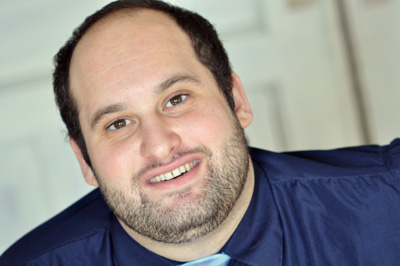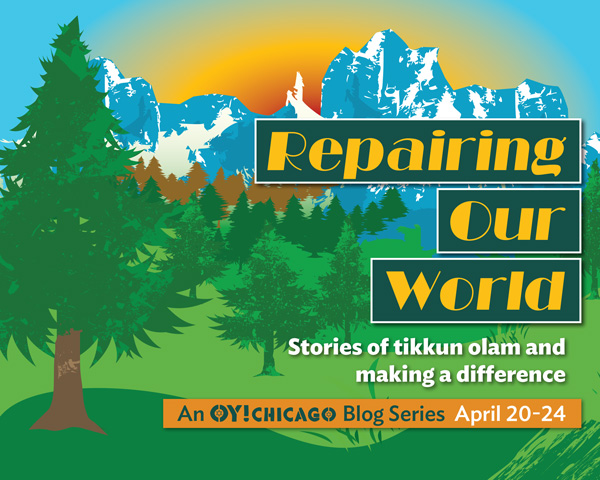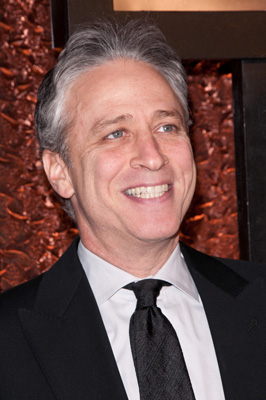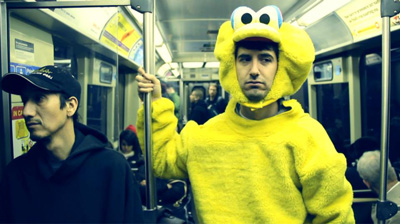
I met David Schwartzbaum at JCC Apachi Day Camp, and have
worked with him there in a number of capacities over the last five years, but
our connection also extends beyond entertaining Jewish children and into the
realm of performance theater.
David started performing theater and comedy in Miami before
moving to Philadelphia and becoming the founder and co-artistic director of The
Off-Color Theatre Company. After producing/acting/writing seven world premieres
including full-length productions like “No-Talent Hacks” and “Bailout! The Live
Action Sitcom,” David moved to Chicago and graduated from the Second City
Conservatory and the iO training program. You can find him writing for www.hipsterjew.com, at the Annoyance Theater taking classes, or at home watching
wrestling.
Last month, I had the
privilege of chatting with David on my new podcast, Under the Lights (listen to the episode here), which highlights
the work of Chicago artists — actors, directors, writers, musicians,
improvisers, performance artists, casting directors, and others. Each episode
is a unique opportunity to get to know the people who make up our Chicago arts
community, and a place for artists to promote their work. New episodes are
released every Monday and Thursday. You can subscribe to the
podcast on iTunes for free or listen to/download individual episodes
at underthelights.libsyn.com.
You can also connect with us on Facebook at www.facebook.com/UTLPodcast and on
Twitter: @UTLPodcast.
David is
definitely a Jew you should know, so I also asked him eight questions about his
comic influences, icons, what he’s up to and who would be on his Jewish Mt.
Rushmore.
1. What comedians influenced you at a young age?
It all starts and ends
with Mel Brooks, who truly influenced me at a very young age without me even
realizing it. Blazing Saddles, History of the World Part I, The Producers, these were the films that
truly got my brain working differently. Mitch Hedberg was a huge influence on
me as well, I listened to him when I was 13 and was blown away. I couldn't
believe how smart and funny he was. It infuriated me my brain didn't work the
way his did, I was impressed, I was jealous and I had to do what he was doing.
At 16 is when I watched my first George Carlin special, and he made me so
scared. The stuff he was saying scared the hell out of me to the point where I
said, wow, I got to write like that ... and I never will
2. What is your favorite Tom Arnold movie?
You know ... truth be
told ... I cannot think of one Tom Arnold movie! Like no joke! Was he in the
movie ... what was that movie that had all that controversy after 9/11? Big Trouble? (just looked it up on IMDB)
OH NO! That's Tom Sizemore! hahahaha! Oh boy, this is a disaster. This is a
true story. I was watching the second or third season of Last Comic Standing, this had to be 10 years ago, and they said
they had a guest judge, “comedy legend” Tom Arnold and I turned to my mother,
whom I was watching the show with, and I said, “comedy legend?” And my mother
turns to me and says “eh. Just let him have it.” That's my Tom Arnold memory.
3. What makes you laugh?
The darker the better.
Someone getting a paper cut? Not so funny. Someone being put into a giant paper
bag and then that paper bag being shaken violently until the man turns into a
pile of (kosher) gelatinous goop and then a dog licks it up? HILARIOUS.
4. What song played under the picture montage in your bar
mitzvah video?
No Joke. “World's
Greatest” by R. Kelly.
5. Who are the best comedians or groups working right now in
Chicago?
You hear of this thing
Book of Mormon? I hear it's pretty
good. Ryan Archibald is fantastic. He's directing a lot, but go see anything he
does. The show I've watched more than any show since I've been in Chicago is “Messing
with a Friend at the Annoyance Theater; Susan Messing is a queen. The Ruckus at
the iO is a fantastic Harold team. Although I haven't gotten a chance to see
them, I've heard amazing things about the CIC team Gigantic, they've got some
hilarious people on that team. If anyone wants to take me, I'm a very mediocre
date!
6. What projects do you have coming up?
I've got two projects
opening at the end of April I've been working tirelessly on.
I am writing and
producing a five-episode, live-action sitcom entitled “In Fraud We Trust,”
which will be going up at Stage 773's Blackbox all through May, Thursday nights
at 10:30 p.m. as well as a ‘60s cabaret-style sketch revue show that will be
happening at the iO Theater Fridays at 8 p.m.
Also stay tuned, my
improv group “Switch Committee” will be starting another run in April as well.
Check us out at www.Switchcommittee.com.
7. Who is on your Mount Rushmore of famous Jews?
Oh boy. Wow. Mt.
Rushmore only has four? Sheesh. Man, this is narrowing it down, but just like
the premise of Aladdin, only the most
pure-hearted can get the prize.
1. Theodore Herzl. He
was a baller. Everyone was like, “Yo Herzl. Uganda?” And he was like “****
no.” They were like, “come on East Africa!” and he was like, “suck it.” Guy was
the Kanye of the early 1900s. He changed the game.
2. Albert Einstein.
Gotta go with Einstein, without him we wouldn't have nuclear weapons.
3. Joan Rivers. THAT'S
RIGHT! I'M PUTTING A WOMAN ON THE MOUNTAIN! A POWERFUL, INTENSE, BEHEMOTH OF A
WOMAN! She had more balls than any man on this mountain! Her and Herzl! Biggest
balls of all Jews put together!
And of course, number
four, is the person we all wanted to be, the person our parents brought up
every time we didn't want to go to temple and that is:
4. Sandy Koufax. “If
he didn't play in the World Series on Yom Kippur then you cannot play your Game
Boy on Friday nights!” Damn you Sandy Koufax, you talented Semitic beautiful S-O-B.
8. Have you found the afikomen?
Yes I did! But it was
at the same time I found out that God doesn't exist, and oh man was that a real
buzzkill!


























.jpg)



